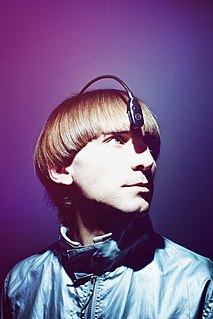A Quote by Neil Harbisson
Knowledge comes from our senses, extend our senses and we extend our knowledge. Let's stop building apps for mobile phones and start building apps for our bodies.
Related Quotes
Literature and the other arts play with pattern - our brains understand our world by recognizing patterns - and with possibility. The arts harness our sharpest senses, sight and sound, and our richest ways of understanding, in language and narrative. They were our first schools before schools were ever invented. They develop our imaginations, extend our possibilities, and deepen what we can all share.
For many ages it has been allowed by sensible men, Nihil est in intellectu quod non fuit prius in sensu: That is, There is nothing in the understanding which was not first perceived by some of the senses. All the knowledge which we naturally have is originally derived from our senses. And therefore those who want any sense cannot have the least knowledge or idea of the objects of that sense; as they that never had sight have not the least knowledge or conception of light or colours.
In the new alchemy, we have a similar kind of way of thinking. Our internal space includes our intuitions, our thoughts, our senses and our feelings, and from these we construct or build a picture of the outside world. From intuition and thought, we construct time. We also construct space from thought and our sensations. From our senses and our feelings, we experience energy, and from our intuitions and our feelings, we experience motion.
All we have to believe with is our senses, the tools we use to perceive the world: our sight, our touch, our memory. If they lie to us, then nothing can be trusted. And even if we do not believe, then still we cannot travel in any other way than the road our senses show us; and we must walk that road to the end.
Our senses enable us to perceive only a minute portion of the outside world. Our hearing extends to a small distance. Our sight is impeded by intervening bodies and shadows. To know each other we must reach beyond the sphere of our sense perceptions. We must transmit our intelligence, travel, transport the materials and transfer the energies necessary for our existence.
All men naturally desire knowledge. An indication of this is our esteem for the senses; for apart from their use we esteem them for their own sake, and most of all the sense of sight. Not only with a view to action, but even when no action is contemplated, we prefer sight, generally speaking, to all the other senses. The reason of this is that of all the senses sight best helps us to know things, and reveals many distinctions.
We have heard of a Society for the Diffusion of Useful Knowledge. It is said that knowledge is power, and the like. Methinks there is equal need of a Society for the Diffusion of Useful Ignorance, what we will call Beautiful Knowledge, a knowledge useful in a higher sense: for what is most of our boasted so-called knowledge but a conceit that we know something, which robs us of the advantage of our actual ignorance? What we call knowledge is often our positive ignorance; ignorance our negative knowledge.






































